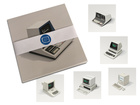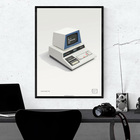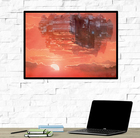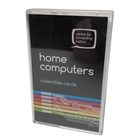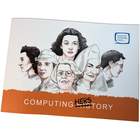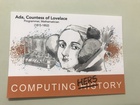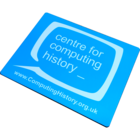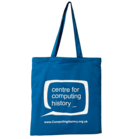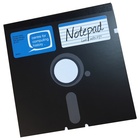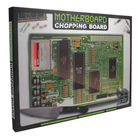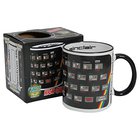
| Home > LEO Computers > Lyons Electronic Office (LEO) Archive > CMLEO/FL - Frank Land Collection > Oral history interviews > Vincent Bodsworth: In ... rd March 2022, 70786 |
Vincent Bodsworth: Interview, 3rd March 2022, 70786
| Home > LEO Computers > Lyons Electronic Office (LEO) Archive > CMLEO/FL - Frank Land Collection > Oral history interviews > Vincent Bodsworth: In ... rd March 2022, 70786 |
Copyright
Vincent Bodsworth and LEO Computers Society
Digital audio of a recorded interview with Vincent Bodsworth, who had a long career in computing including with ICL.
Interviewer: Mike Hally
Date of interview: 3rd March 2022
Length of recording: 42m18s
Copyright in recording content: Vincent Bodsworth and the LEO Computers Society
Abstract: After leaving Cambridge University where he learned of EDSAC II and attended lectures by Maurice Wilkes, Vincent joined ICT in 1967 in technical support (sales). ICT then merged with English Electric LEO to form ICL and it was there that he learned of LEO. In 1972, he moved to East Africa, staying for 6 years before returning to ICL in marketing the New Range. Relocated to Trinidad as ICL's general manager for the Eastern Caribbean region before finally leaving ICL in 1985 to join F International and later SQL Systems International and then Thomson Publishing in 1994, using Oracle. Travelled and worked in many countries until ill health forced retirement and he became active in the LEO Computers Society. Date : 3rd March 2022Transcript : MIKE HALLY: It's the third of March 2022. And I'm MH. I'm interviewing VB to give us a story of his involvement with LEO computers from the earliest days. So, good afternoon, Vincent. We’re recording this interview as part of the LEO Computer Society Oral History Project. The audio version and the transcript will be lodged in the central archive and made available for researchers and members of public. So, to start with, could you just introduce yourself in your own way please? VINCENT BODSWORTH: I'm VB. I was born in 1945 just before the end of the war. And I've always had an interest in technical things I suppose. I was born near Sheffield but actually in Derbyshire not Yorkshire. MH: While we’re on the earliest part of your history, can you just say what your father and mother did and a few things like that? VB: During the war, my father was in the RAF and my mother was in the women’s RAF. And that’s where they met. However, my father sustained some injuries during the war. He was in a Lancaster bomber which crash landed. And this didn't kill him then but we believe it killed him about seven years later. I was about six and a half years old. But by that time, the Ministry of Defence, say they have no knowledge of the matter. My mum was essentially an artist. She studied art in London before the war and she painted all her life and drawing or similar stuff. I was brought up in Sheffield by my mother and then subsequently, a stepfather who I would say was not a good man. MH: Can you just tell me about your first school and secondary school and so on? VB: I first went to a convent. My mother was a Roman Catholic. She's no longer alive. And her side of my family were very devoted Roman Catholics for many generations. They were recusants during the period when Catholics were persecuted and included people who actually were in the service the estates of Dukes of Norfolk, . I went to convent initially but then some fairly wealthy relatives offered to pay for me and my brother to go to boarding school. So, I went to boarding school at the age of seven, so that was for a good Catholic education. It was run by the Jesuits. They’ve actually managed to squeeze all Catholicism out of me rather than the other way around. Then after I got to secondary school Mount St Mary’s near Sheffield I started to prosper. Primary school I didn't do so well, but once I got into mathematics and physics and stuff like that, I really found my element. MH: So, those are very much your special subjects, were they? VB: Yeah. I subsequently went on to study maths and physics at Cambridge university because I'm one of these boys who wants to know how everything works. And my grandad was very curious because when I was given a present, the first thing I ever did was take it apart, often not being able to put it back together again. But I wanted to know how it worked. Playing with it was not a pleasure. Knowing how it works was. So, I did my A-levels mainly on maths and physics. MH: And did you know what sort of career what you wanted to go into at that point? VB: Not a faintest clue. I mean doing maths and physics, I did that at university, I might find myself in a job that had to use those capabilities, but I didn't have a clue at all. A lot of my family on my mother side were law, lawyers, magistrates, et cetera. And I did think of that at one time. In fact, sometimes, I think back and think perhaps I should have done it but not to be a lawyer in a court. I would have loved to be a patent attorney because that would feed my desire to know how everything works. MH: That’s quite interesting. I've not heard anyone say that before. And it's a very big thing now, isn't it? VB: I worked in my subsequent life in patent information company called Derwent International in IT, but you know providing service for their patent database basically. Anyway, in 1964, I went to Cambridge University- I managed to get a place at Queen’s College to read mathematics and theoretical physics and also attended in 1964 lectures by Maurice Wilkes. And heard about the EDSAC (II) which was still in operation. It wasn’t part of my curriculum but I didn't actually stay on the course to learn how to program but that would have been what I would have done next. MH: Can you say a little bit more about anything you remember about Maurice Wilkes and those lectures? Because he was obviously so important to LEO. VB: Well, he was a very good lecturer. He can speak well and make things quite understandable. But he spent an awful lot of time to explain to us about hand cranked calculators and things which I really didn't very much in. I wanted to learn about computers and how they worked and how to get to program one. And it's taking a long time to get there. MH: That’s quite surprising. I'm amazed given that he was a pioneer who was working on the first electronic computers right after the war. In the mid- ‘60s, he was still concentrating more on mechanical calculators and so on. VB: I think probably his purpose in doing that is to understand how computers work or how you can do computers. This is necessary to understand how calculations work. And to do that, you need to go back to basics and learn how mechanical calculators work. I think that’s probably the logic he had in that. He's probably right as well. Anyway, that was the focus. I mean EDSAC was called a calculator . It stands for automatic calculator. Because that’s what he was building in his mind. That’s what he built an automatic calculator and the computer came later. The word computer was around then, but computers were people who calculated. MH: So, you left that course before you really got into the computing? VB: Well, by that time, I was running a band, a rock band so I found I had to cut back on my lectures in order to accommodate the band. Another interest, and since I wasn’t going to be examined on that particular subject, I did not pursued it any further. MH: That’s a quite common story for 1960 students I think the neglecting the studies for the band. VB: However, when I was leaving, then I think it was called the university appointment board who talked to you about what job you would like to do. And I went to the guy and found something I was interested in and he said, have you thought about joining a computer company? He told me about two or three, one was IBM, ICT and the other one was LEO at the time and he set me up for interviews with all three. And subsequently, I was offered only by ICT a job and I took the job with ICT. But within six months of starting then in 1967, ICT was joined by English Electric LEO , to form ICL, so that’s really the first time I came across LEO and LEO people. I never actually worked for LEO. Design of the LEO computer came from Maurice Wilkes and EDSAC . I can say a couple of things about joining ICT. When I went for my interview, I thought they seemed a very good company and easy and keen to tell me how things worked so I can understand them. So, when I actually got to the area that I was working in the city in the East Anglia area, I found it from the people with bowler hats and pinstripe trousers. And I was criticised heavily for my broad ties and long hair in my first appraisal. And I just think, “What about my work?” I mean at the time my hair hasn’t got anything to do with it. I did actually change my attitude to that because I realised eventually because you have to conform really to what the customers expect. MH: So, what was your role in ICT then ? VB: I joined as basically technical support in the sales organisation. MH: So, you weren’t personally doing sales, but you were meeting customers and hence, the concern about how you looked. VB: Yes. And we have people from the Bank of England and stuff like that who wouldn’t let a woman through that at the time. MH: So, what was the job like? VB: They were like a breath of fresh air because they all had beards and long hair and stuff. And the terms of the merger were that no staff would be disadvantaged by it so I was beforehand criticised for long hair and other people were told they couldn’t wear a beard. But once we merged then all those restrictions were lifted. MH: Interesting. VB: And progressively, I have found I was working with more LEO people. MH: So, how did you that find phase when you’d all merged? Because I have heard from others that it was difficult to merge the different ways of working. VB: Well, yes it was but it wasn’t just that merger. We had in our office, this punch card company that would service gas industry. And they used to barricade themselves behind grey filing cabinets until they got their own space. And they moved them up to the English Electric office in Euston which was open plan so they put their barricades up again. I suppose in the city area and East Anglia, there wasn’t much presence of English Electric so that’s why ICT, sort of dominated. And then in 1972 I decided that I wanted to go abroad so I took a job in East Africa as technical support for a couple of years, but I stayed for six. When I came back to UK, I worked in International Division in marketing. And then that’s when I met John Pinkerton and quite a lot of other LEO people that were engaged in the New Range . I was involved, New Range introduction in the International Division. This happened in 1977 through to about 1982. MH: What was the new range that John Pinkerton was involved in ? VB: The New Range was to replace all of ICT and English Electric LEO’s mainframes. And there's a lot of background to it because EE and LEO people were very, very much engaged in it, people like David Caminer and John Pinkerton and so on. But it was called the, synthetic option, not based on any previous computer. I mean English Electric had sort of already de-committed from LEO. They weren’t doing anything more developing LEO. They were moving LEO, compilers and things across to their IBM compatible platforms that they were developing called System Four. So, ICL had the decision between System Four and 1900 series as being their main platform but in fact, they went for what they called synthetic option eventually which was 2900 series. In my view, actually a bad mistake. But then I started to work then with people like David Caminer and others who had come from LEO MH: What was the distinctive thing about the LEO people still? Did they have their own sort of personality on this as a group? VB: Yes. They're very good basically. Some of them are a little bit hard to get on with, but David Caminer was quite a difficult man, but they understood really that, what the business was actually about, satisfying the customer’s requirements and then analysing the requirement that the customers would be able to use rather than just selling. MH: And not just giving them software off the shelf. It was actually a customised solution I gather. VB: Yes. But I subsequently, came to believe that software off the shelf was very good solution to many problems. But analysing the requirements properly and then crafting a solution which can involve software off the shelf, with custom development for unique reqirements, you wouldn’t get the right solution long-term, developing everything new. But this is what was still happening in the ‘70s and the ’80s was not a good strategy. But I have also felt that because of my experience in international division in Africa because after that, when I've done the 2900 Series introductions I felt that packaged software was the way to go.But at that time in ICL I wanted to really go into general management because that, I guess some of the people that I admired most in ICL were in general management. But there were no opportunities in ICL so I resigned. And as I was about to leave when the job of ICL general manager for Eastern Caribbean came up. So, I went to Trinidad for a couple of years and then the USA for a couple of years. And we found lots of good opportunities in the USA for getting our products, not necessarily ICL mainframe products into the marketplace but they are always squashed by product development. And I got fed up with that by 1985 and left ICL. MH: So, they were squashed by ICL’s own product development people? VB: Yes. And so development all turned around the British government’s requirements for large computers for doing tax calculations and things. And they were supported in that that belief by the British government Unfortunately the British government is not a big customer on a worldwide scale. The governments in other countries are not structured like British government. The government tends to be very domestic type of market. Whereas the likes of Hewlett Packard and others that came subsequently address such broader market base. And I have to say, IBM did the better job as well. I think that IBM learnt from I would say mistake of going for a synthetic option and not satisfying the existing customer’s requirements first because I'm told that when IBM developed AS/400, originally, it was a development to replace 360 series, but they saw what ICL had done and done in the market by introducing new and forgetting the compatibility and they basically continued to serve the 360 architectures of the present day, still satisfy that demand. And they re-directed the AS/400 into a brand-new marketplace which was small to medium businesses with application packages. And it was a very innovative machine and really good architecture, but it was incompatible with 360 software , so they didn't offer it to existing customers. In fact, there's perhaps an opportunity for departmental system in large organisations, the same reason of application packages. That’s an absolute requirement that ICL should have satisfied. Serve existing customers. MH: So, it sounds like you got pretty frustrated with ICL. VB: They mostly developed mainly for the Government division and some other parts of the UK. One product which was developed was DME which was demanded by the non-government Sales Force to be compatible with 1900 series and Sytem 4 for existing customers MH: You were just saying around the point you were leaving ICL, I think. VB: There are various things I wanted to do. I just found that general management wasn’t my forte. And so, I left. Initially, I joined F International. It was the service company which was then being run by Hillary Cropper. And I joined them as technical director to try to improve their technical capability because they were very weak in that area. And two or three years I was able to trans and stuff for how you're working and work centres and stuff like that. MH: What date was this? VB: It was 1985. And in the late ‘80s, I left to join a start-up that was called SQL Systems International by which it was being started up by in fact an ex-LEO person called Frank Stonehouse as chairman and John Gripton from ICL to build on an already existing maintenance management package based on the Oracle Database and which was supported by Venture capital. And I joined them as technical director as well in the actual development team and setting the product characteristics. We were quite successful for a few years. We had customers like British Airways with the maintenance of the non-flying assets . It wasnot British Airways aircraft, but maintenance of other equipment, buses and stairways and everything else, and management of that. Also, the National Grid, a huge project at the National Grid. But probably about, I don't know if it's ’94 or something like that, it was I think a financial crisis. And we have been quite successful, but that success meant that we got the large companies who are poor payers in terms of prompt payment, so cash flow was a problem. And then with the crunch, the bankers who we’ve got loans with, wanted their money back. And then the company potentially went bankrupt but was actually bought out by another company. But during that buy-out, they basically fired all the directors. I mean the logic was they didn't know who was responsible for the current position and they weren’t to hang about to find out who it was so we could all go. And Frank by that time had actually died, or was dying of cancer which is another factor which probably triggered the demise of the company. I joined , which is now part of Reuters, the Thomson Publishing part in Derwent patent information company as their technical director running their IT department. So, that’s my first time actually in a user role. I did a lot of stuff with Oracle and we were an Oracle user, having problems with Oracle, but I was able to sort of fix those problems. MH: When did you join Derwent Thomson? VB: I think it must have been about ’94. I worked with them for a few years and then decided I really wanted to get back in the supply side of the IT industry but in software. And I joined Oracle in 1997. And I joined the Oracle One Consulting so implementing the systems for the big customers. They made the change of direction in serving that. I was part of sort of supposed to be an elite group of international consultants. About 1999, they decided that they weren’t going to really pursue that strategy of this international stuff. So, I was told by my boss who was actually in America that if I wanted to stay with Oracle, I probably best find myself a project role because if I stayed where I was, I might find myself without a job. So, I took the role, of director as, project director for Kellogg Latin America. Kellogg’s were implementing the Oracle e-Business suite businesses throughout the world based in the UK, Manchester, Latin America, based in Mexico and North American based at Battle Creek, Michigan, so I took the role of the project director for the Latin America working in Mexico and in Venezuela. And then I was sort of kicked upstairs in 1999 to run the whole thing for Oracle from Battle Creek, Michigan. And Kellogg’s fell out with Larry Ellison, the Oracle founder, and decided to make no further develop with Oracle. So, I then went to South Korea. I did a similar job on a very large project at POSCO, a steel company, at that time the largest in the world, and spent a couple of years there starting in year 2000. MH: And you’d be in your mid-50s by that time then? VB: Yeah. I enjoyed the role of project management of technical projects because they don't have the same amount of line management tedium, you expect most people to be well motivated and able to do the job but if they aren’t well motivated and aren’t able to do the job then they just have to go. But while I was on the, the POSCO project, people kept saying to me, “You seem to know an awful lot about the steel industry. Have you worked in the steel industry?” And I said, “No” And then it clicked. I said well I was born in Sheffield. MH: Of course. VB: And I did go to school with an iron works at the front and the coal mine at the back. And most of my relatives worked in the steel industry and I was taken round the steel works at school.. I suppose you just mop this stuff up. MH: Yeah, immersed in it. VB: Yeah. I mean it's changed in the sense that they know you know electric arc furnaces and things like that and try to reduce the carbon footprint and various things but the metallurgical process is actually the same. You can't change it as it’s Physics and Chemistry. So, I sort of then moved into being a specialist in mining and metals I eventually got the worldwide lead for mining and metal industries in the Oracle Business Unit so I was with large customers worldwide. I helped customers in Chile, in Brazil, in Kazakhstan, in Russia, in Italy, in Germany, in Ukraine, In Japan ,not many in the UK. There's not many mining and metal companies in the UK except pet in IOreland MH: Oh, big thing stills in Ireland. VB: It took me up to retirement essentially. I actually, at various times in all of that, I had come across LEO people. People I met in F International many worked on LEO computers. Some of the women who are working there knew LEO so I was constantly touching contacts with LEO but never actually worked on it. MH: That was interesting. VB: I found I’ve got a brain tumour and it’s on my spinal cord. And I was told it needed to be operated on because it could be quite dangerous. So, that sort of forced me to retire. I had the operation. It took me two months in intensive care. MH: Gosh. VB: And when I came out, I couldn’t walk, talk, eat or anything so it took me about six months to get back into some sort of shape. MH: Gosh. VB: And then I was sort of forced into retirement and came across the LEO Computer Society and told them I was very interested in the history of computer generally. I've also taken on a role at the National Museum of Computers as a volunteer guide which I still do. So, I took two volunteer roles basically in the LEO Computer Society and National Museum of Computers. I occasionally, do a little bit of consulting a couple of weeks or so in an area that I understand well. MH: You seem to have had an amazingly varied working life, different companies, different countries, different types of jobs. VB: Yeah, a lot of don't but I love change. I love doing different things and challenges and stuff like that. And I do, I find that you can bring experience in one area to another. MH: Could I take you back to something you mentioned which we skipped over was your time East Africa. I think you said six years. VB: Yeah. I shouldn’t have stayed that long really. But at that time, I had such a comfortable life there. You know we had two children and of course we could have a nanny and a gardener and so on and so forth. When we went there, we never thought we’d be people that would have servants but you know you really have to because they need the work and makes your life so much more pleasant. MH: And which part of East Africa was it? VB: I covered the whole of East Africa but lived in Nairobi Kenya. And we had also Mauritius, Seychelles, also Uganda, Tanzania and Zambia mainly. And we had mining industry again in Zambia as well. There's a bit of the mining industry in Tanzania too. But I was always in technical support but I guess you could say I was always selling as well because in large systems in particular, the sales role it’s not really piling highand selling cheap or anything like that. It's really, understanding the customer needs and helping them to get to the right solution which is what I found refreshing about LEO. Because it's the way that I developed. MH: So, the sales and the support were really intertwined very much. VB: Yeah, most of them over there was basically African when I was in the technical support team bringing knowledge in to it and training them up which is quite a tough thing to do because I felt quite too that if you actually recruited people that seem to have the best talents for the job, it happened to be mainly Indians and as soon as they got training, they buggered off to Canada. MH: Yeah. VB: I was accused of being a tribalist as well but at the time I couldn’t see the difference between the tribes so I can't possibly be a tribalist. MH: Right. VB: By the time I left I could tell the difference because they are quite distinct. MH: Where were you actually living when you were covering East Africa? VB: We lived in Mombasa for about six months initially where I did a job at East African Customs and Excise installation, their computerised installation, helping and developing stuff and supporting them. And then we lived in Nairobi. But I visited various counties frequently especially Uganda after Idi Amin. I'm not going to use them on this particular interview but I have quite a lot of stories at that time. MH: So, coming back to…. VB: I think I stayed too long. And you know because I wasn’t really developing anything further just enjoying the life. One of the reasons we went, my wife wanted to go, we couldn’t get enough money together before we went to buy a house, or to get a deposit on the house. By the time we got back, we had so one of the objectives which was to get us on the housing ladder was met and I got my job coming back in ICL in international division which is where they were often, more LEO people, bank workers, international projects, ex-Leo, Frank Stonehouse the guy I mentioned that I worked with later was the International Division Director died at 72 . MH: So, coming back to present day, are there other things you do in retirement or is it mainly the computing history stuff? VB: I do some of the gardening. I've got an allotment. And reasonable amount of cycling and exercise and stuff like especially during the lockdown. I did some programming. And sometimes, it's actual coding but also, I've got the LEO Computer Society website and you know program to membership system which is relatively automatic updating new members and stuff like that. So, I still write programs . MH: Great. VB: Whatever job I was doing, I would always get my hands on and do things. MH: Yeah. Well, I think we’ve pretty well covered everything unless there's something that you wanted to talk about that I've not asked you. VB: So, bring it up the present day. Another thing perhaps that for, it's sort of makes sense, I have become very much a student of the history of computing, learning everything I can about the stages. But I found out essentially, that where my mother worked and not in Bletchley Park but she worked in a listening station in Scarborough during the war, taking down the enigma messages in morse code. She didn’t tell me about it until th 1970’s or later when these things start to become public. And I think it was the realisation that I should have been born at the time when computer technology was first coming into the world. Okay, we had stuff before the war. But they, weren’t ever finished ,the actual birth of the computer industry in 1940s when I was born. And then I had sort of come into it as it were almost by accident myself that I wanted to go in altogether in terms of my knowledge. I wanted to learn everything about the stuff at the Bletchley Park in the Museum of Computing. And another thing there that the Museum of Computing have, they’ve got an ICL 2966 which I was actually responsible for launching in the International Dicvsion of ICLs o it's sort of my baby. They’re building a replica of EDSAC I don’t know if you knew that. MH: That’s interesting. VB: It's just about working. MH: Right. VB: I'm hoping we will get a much bigger LEO presence there because we can join up the dots as it were from EDSAC and so on. MH: Great. VB: I think I've covered almost everything. MH: This interview with Vince Bodsworth has been recorded by the LEO Computer Society and the Society would like to thank you very much for your time and reminisces. The interview and the transcript form part of an oral history project to document the early use of electronic computers in business and other applications but particularly in business. Any opinions expressed are those of the interviewee and not of the society. The copyright of this interview in recorded form and in this transcript remains the property of the LEO Computers Society 2022. Provenance : This exhibit has a reference ID of CH70786. Please quote this reference ID in any communication with the Centre for Computing History. Copyright
|
Click on the Images For Detail
|

